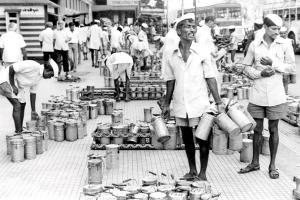A historian passing through Mumbai for a talk tells us about the intersection between food, culture, and society

Dabbawallahs are symbolic of how food shapes a society's culture, having mediated the binary between home and office
Often people forget that academic inquiry is much more about asking the right questions than finding the correct answers. And that was precisely the focus of a talk called The Gastronomic History of Nationalism, which took place at CSMVS earlier this week, conducted by historian and director of Kolkata's Victoria Memorial Hall, Jayanta Sengupta, who was visiting the city.
Having taught in Jadavpur University, Kolkata, and later at the University of Notre Dame in the US, Sengupta — who has done extensive research in the field of nationalism in India, dipping into culture and therefore food over the years — was hoping to initiate a larger inquiry into the intersection between food culture and society, through this talk.
ADVERTISEMENT

Jayanta Sengupta
Whether it was the surfacing of a large number of texts in regional languages in the late 19th century, of which cookbooks were a major part, or deconstructing the confluence of cultures in a metropolis like Mumbai through the prism of food history, the culinary arts, Sengupta tells us, has played an immense role in shaping our society.
He says, for example, the fact that Mumbai's food is such a grand amalgamation of Portuguese, British, Parsi, Gujarati, Maharashtrian, East Indian, and so many other culinary influences, has in large part to do with how the city was the gateway of India. "As a city, it was the stepping stone for most explorers," the historian argues. This approach can be applied not only to understand the larger culinary legacy of a city like Mumbai, but also to explain the smaller facets of its food scene. "Look at the way the dabbawallah system has managed to mediate the binary between the home and outside by providing home-cooked food at the workplace," he says, adding that much of this obsession with ghar ka khaana is pre-empted by a patriarchal rhetoric around food, which is associated with emotions like love and affection. The idea, as such, was to encourage a dialogue that looks at Mumbai's foodscape in a manner that helps identify the cultural and social indices that have impacted it.
Catch up on all the latest Crime, National, International and Hatke news here. Also download the new mid-day Android and iOS apps to get latest updates
 Subscribe today by clicking the link and stay updated with the latest news!" Click here!
Subscribe today by clicking the link and stay updated with the latest news!" Click here!







